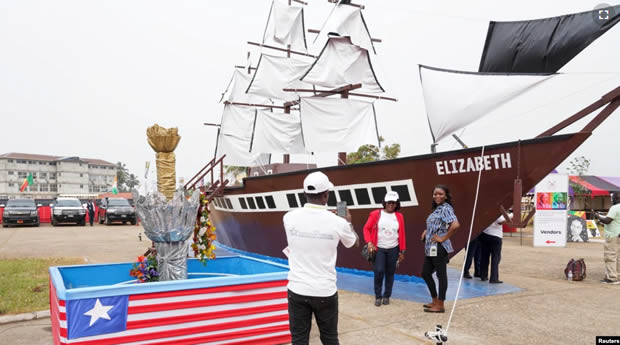
Two hundred years ago, freed slaves from America made their way back to their ancestral homeland of West Africa, an event that led to the establishment of a new country – Liberia. The bicentennial of their arrival was celebrated this week across Liberia.
Decked out in the colors of their flag, Liberians flocked Monday to Samuel Doe Stadium in Monrovia. They were joined by delegates from throughout the region, as well as from the U.S., to witness the beginning of celebrations to mark the return of the first freed slaves to West Africa.
Beginning in 1820, the first ships of free slaves sailed across the Atlantic to the shores of Providence Island. Some were freed on the condition they return to Liberia because their masters feared a growing population of freed slaves. Others chose to return to experience the freedoms that weren’t available to them in America or to Christianize the African continent.
In 1847, the Republic of Liberia was officially formed.
Othniel Forte is a Liberian historian and author. He says the return was significant not just for Liberia, but for other African countries fighting against colonial rule.
“So, this year celebrates that return home. And that return home led into the liberation movement of Africa,” said Forte. “So, as Africa began to get freedom, different countries began to get freedom, and Liberia remained that symbolic land that they could all aspire to.”
Things have not always gone smoothly. In the late 1980s, ethnic divisions and rampant corruption escalated into a brutal 14-year civil war that killed a quarter-million people.
Liberia suffered more setbacks between 2014 and 2016 when the Ebola epidemic killed nearly 5,000 citizens.
But since the fighting ended in 2003, Liberia has enjoyed general political stability.
Ibrahim Nyei is a Liberian political analyst.
“We are celebrating so many things,” he said. “We are celebrating the resilience of our society and the resilience of our sovereign nation. And the collective will of our people to continue to fight for freedom and justice.”
Though ethnic tensions have largely subsided, Liberia now faces other problems, Nyei said.
“We’ve been able to create a united society. We’ve been able to establish co-values around which we all fight, whether American-Liberian, indigenous,” said Nyei. “So, now it’s the collective fight against incompetent, corrupt political leadership that continues to impose harsh conditions of poverty and injustice on the population.”
The bicentennial launch will continue through Wednesday and will include events such as lectures and concerts.
Source: voanews.com























